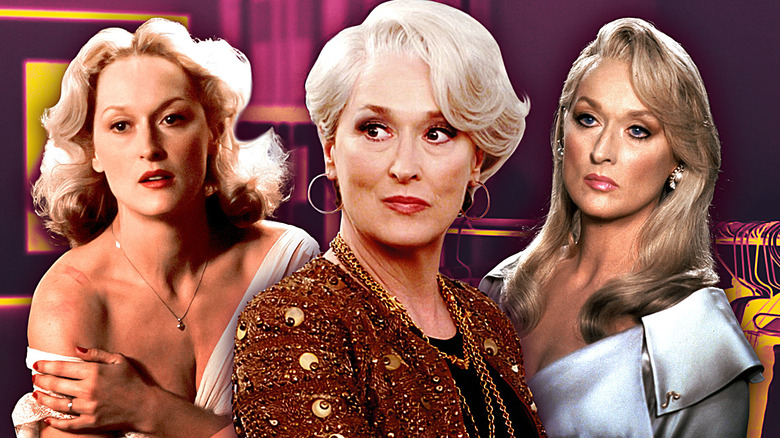
Static Media
One of the most celebrated actors of any generation is Meryl Streep, a titan of stage and screen for the past 50 years. She holds the distinction of being nominated for more Academy Awards than any other actor (21 times), and winning three Oscars. Similarly, Streep has been nominated for the Golden Globe more than any other actor (30 times), and winning eight Golden Globes. Simply put, whenever Streep is on-screen, it's a surefire masterclass in acting, with Streep always delivering transformative magic across her numerous performances.
Throughout Streep's extensive career, she has also ventured into virtually every major genre in her work in film and television. From big-budget musicals and romantic comedies to searing personal dramas and intimate period pieces, Streep has built up an impressive filmography of varied roles. Here are the 15 best Meryl Streep movies ranked, spanning the acclaimed actor's entire film career to date.
Defending Your Life
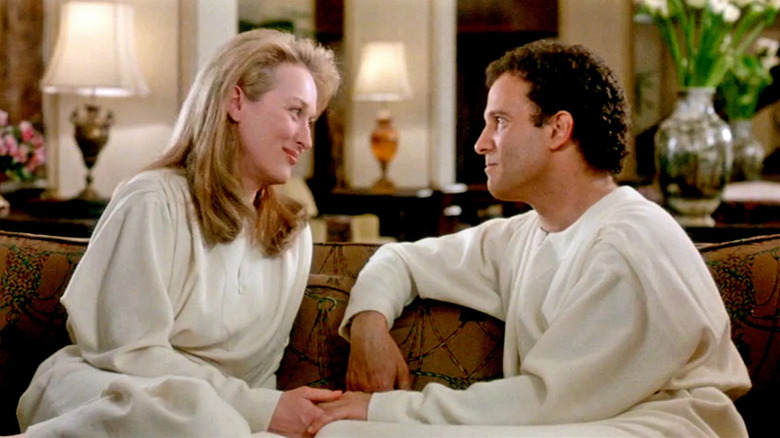
Warner Bros. Pictures
Comedy filmmaker Albert Brooks ventures into romantic fantasy with his 1991 movie "Defending Your Life," with Brooks and Meryl Streep starring as recently deceased individuals in the afterlife. A tribunal determines whether Daniel (Brooks) should be reincarnated on Earth for his soul to grow while Julia (Streep) is permitted to advance to a higher plane of existence. Despite this, Daniel and Julia try to make their post-mortem love succeed as they examine the nature of human existence and consciousness.
"Defending Your Life" is Brooks at his most sentimental and whimsical, which is particularly surprising given the rest of his more sardonic directorial filmography. His on-screen chemistry with Streep is palpable, with Streep turning in a pleasant, if somewhat understated, performance as Julia. Similarly, the comedy in "Defending Your Life" is more reflective and existential than going for the conventional gags. Streep takes to this brand of comedy effortlessly, matching Brooks joke for joke as they ponder the meaning of life through their dearly departed characters.
Julie & Julia
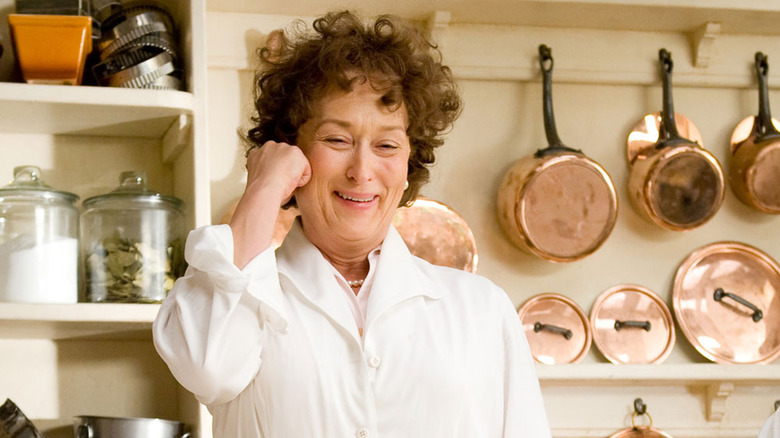
Sony Pictures Releasing
Filmmaker Nora Ephron's final movie, 2009's "Julie & Julia," combines the stories of two very different women: celebrity chef Julia Child (Meryl Streep) and amateur cook Julie Powell (Amy Adams). As Julie decides to recreate all 524 recipes from one of Julia's cookbooks and share her experiences through her blog, it is juxtaposed with Julia's immersion into French cuisine in the '50s. Both women face their own personal challenges as they become increasingly obsessed with the culinary arts, but find solace in their cooking. This culminates with Julia receiving her first cookbook publishing deal while Julie and her husband celebrate Julia's legacy in 2002.
While Adams and co-star Chris Messina keep the 2002 sequences entertaining and relatable enough, it's when "Julie & Julia" showcases Child's story that the movie really shines. Streep isn't so much impersonating Child but channeling her energy, right down to her subtle posture in every scene. Julia's triumph feels more earned and revelatory than Julie's, with the movie as a testament to Child's legacy as a cook and inspirational television personality. Streep earned her 16th Academy Award nomination for "Julie & Julia," ultimately winning a Golden Globe for her performance.
The French Lieutenant's Woman
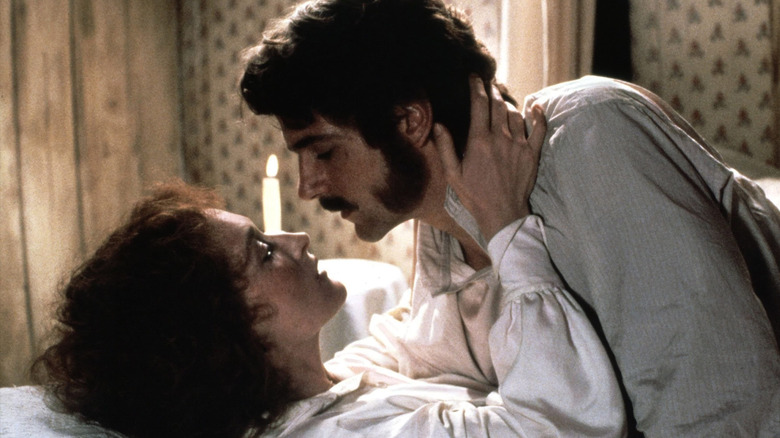
United Artists
Meryl Streep's first top-billing role in a movie is in the 1981 British film "The French Lieutenant's Woman," based on the 1969 novel of the same name by John Fowles. Streep, with co-star Jeremy Irons, play dual roles in the film, with the story covering two very different romances across history. One tale is set in the Victorian era, with paleontologist Charles Smithson (Irons) falling for disgraced governess Sarah Woodruff (Streep). The other love story is set in present day, with actors Mike (Irons) and Anna (Streep) conducting an illicit affair during a movie production recounting Charles and Sarah's romance.
The dual narrative structure and present day premise makes "The French Lieutenant's Woman" a postmodern movie, rather than a strictly stuff period piece melodrama. The juxtaposition of the two time periods and protagonists offers a sharp and effective contrast, elevated by the movie's detailed art design. Streep and Irons play off each other well, with Streep balancing the more reserved Sarah with the increasingly detached Anna. Streep earned her third Academy Award nomination for "The French Lieutenant's Woman" and her first in the '80s, starting one of her most impressive decades on-screen.
Adaptation
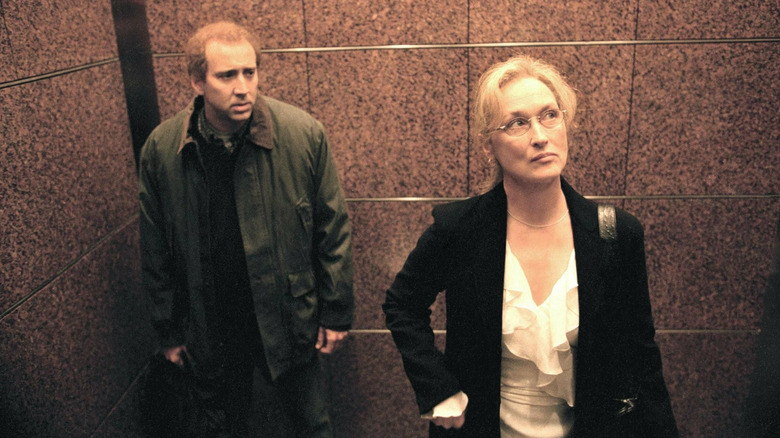
Sony Pictures Releasing
Perhaps the most amusingly offbeat movie in Meryl Streep's filmography, 2002's "Adaptation" has real-life screenwriter Charlie Kaufman struggle adapting author Susan Orlean's "The Orchid Thief." Streep plays Orlean while Nicolas Cage pulls double duty playing both Kaufman and his fictional twin brother Donald, as the siblings try to write the proposed adaptation together. As the Kaufmans look into Orlean's life to help crack their story, they discover she is involved in illicit criminal activity. Learning that the Kaufmans are onto her secret, Orlean decides both brothers must be murdered to maintain her cover.
Not only reimagining Charlie Kaufman as a pair of dysfunctional twins but Susan Orlean as a murderous crook, "Adaptation" is an absurdist, postmodern comedy. Streep matches Cage's usual manic energy with her most unabashedly goofy performance to date, fitting right into the movie's overall tone. Beyond its bizarre premise, "Adaptation" is a smartly written film, arguably the funniest that Kaufman has ever written. With her performance, Streep continues to quietly build her comedic credentials, branching from her usual dramatic roles, earning her 13th Academy Award nomination in the process.
Postcards from the Edge
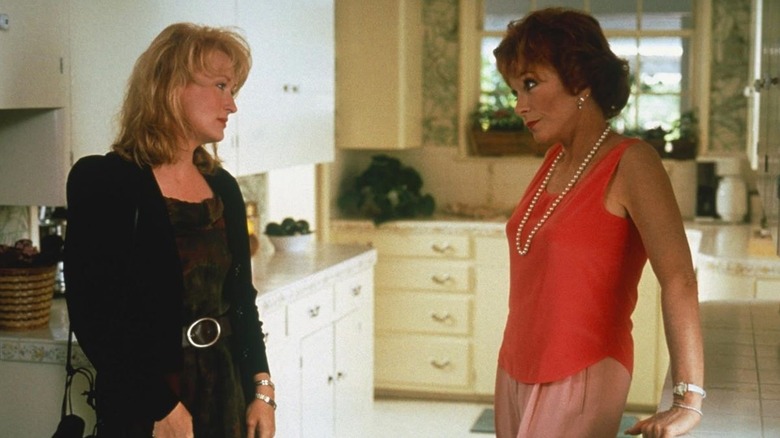
Columbia Pictures
Some of Meryl Streep's best work is with filmmaker Mike Nichols, among them being the 1990 dramedy "Postcards from the Edge." The movie adapts Carrie Fisher's semi-autobiographical 1987 novel of the same name, reflecting on her struggles with addiction and career difficulties as an actor. Streep plays Suzanne Vale, an actor who moves in with her mother Doris (Shirley MacLaine) after she completes a stint in rehab for substance abuse. This leads to Suzanne having to reconcile with her narcissistic mother, who has had her own success as a popular actor, while the two women share a home once again.
Streep and MacLaine bounce off each other well, buoyed by Fisher's sharply written, dialogue-driven adaptation of her own novel. Though Streep had done comedy with Nichols before, it feels so much more fully realized and suited to her strengths in "Postcards from the Edge." The movie also provides Streep with one of her earliest on-screen singing roles, including singing a song written by prolific children's author Shel Silverstein. Streep's acclaimed performance earned her her ninth Academy Award nomination, her first in the '90s.
Death Becomes Her
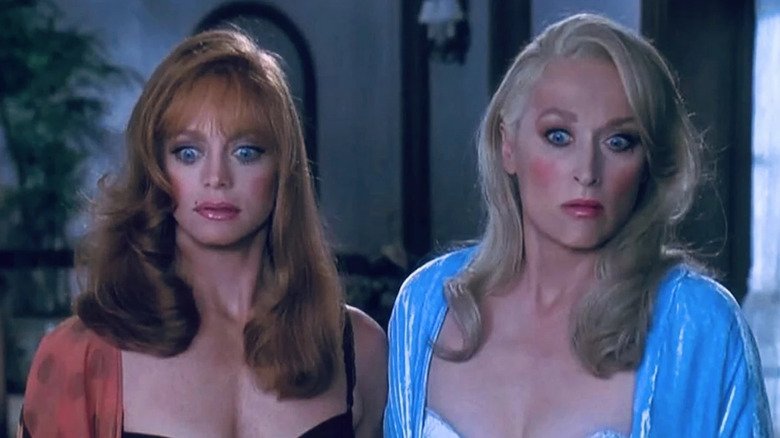
Universal Pictures
After building an impressive catalog of sophisticated dramatic projects, Meryl Streep made the sudden pivot to horror comedy with 1992's "Death Becomes Her." The movie details the feud between actor Madeline Ashton (Streep) and writer Helen Sharp (Goldie Hawn), with both women vying for the affections of plastic surgeon Ernest Menville (Bruce Willis). As the women grow older, they take a magical potion to restore their vitality, only to learn that immortality comes at a gruesome price. The two go through lethal lengths to keep Ernest for themselves, with their enchanted bodies enduring escalating levels of murderous mayhem.
With a reputation for giving her all in every performance, Streep demonstrates a keen mastery of physical comedy. This fits "Death Becomes Her" to a tee, with its over-the-top gags and intentional campy sensibilities befitting its horror-tinged hilarity. Streep finds a Looney Tunes-esque scene partner in Hawn as their characters try to one-up each other while Willis plays against type as their meek love interest. For her part, Streep didn't particularly enjoy the specifics-oriented production aspect of "Death Becomes Her," vowing not to work on any visual effects-heavy projects again.
Doubt
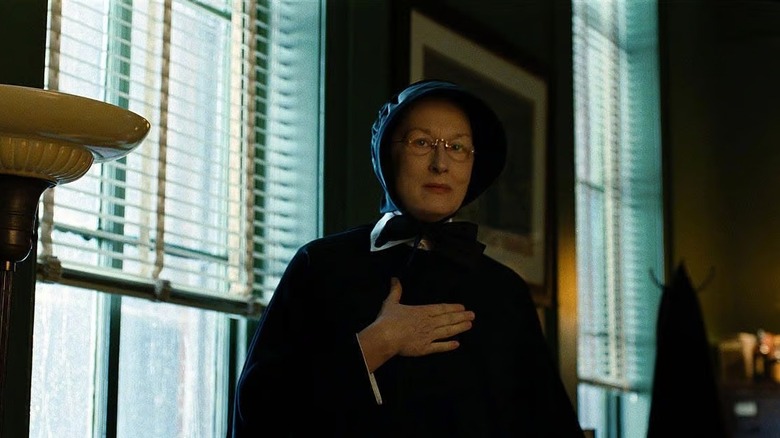
Miramax Films
Filmmaker and playwright John Patrick Shanley adapted his 2005 play "Doubt" for the screen in 2008, with Meryl Streep leading an all-star cast. Set in the Bronx in 1964, Streep plays Sister Aloysius, the principal of a parish school attached to a local Catholic church. Aloysius becomes suspicious of the church's head priest, Father Brendan Flynn (Philip Seymour Hoffman), over questionable associations with a boy at her school. This leads to a tense, gossip-fueled confrontation between the two over his conduct and whether either of them has committed impropriety.
"Doubt" has an absolutely stacked cast, with Streep and Hoffman joined by Amy Adams and Viola Davis, and everyone is at the top of their game. Streep is a sternly cold and calculating presence as Aloysius, with everyone, including the audience, on their toes whenever she's on-screen. Her verbal sparring scenes with Hoffman and the lengths her character will go to have her suspicions proven right are downright haunting, while Davis quietly steals the show. Streep received her 15th Academy Award nomination for "Doubt" in what is possibly her most sinister role to date.
The Bridges of Madison County
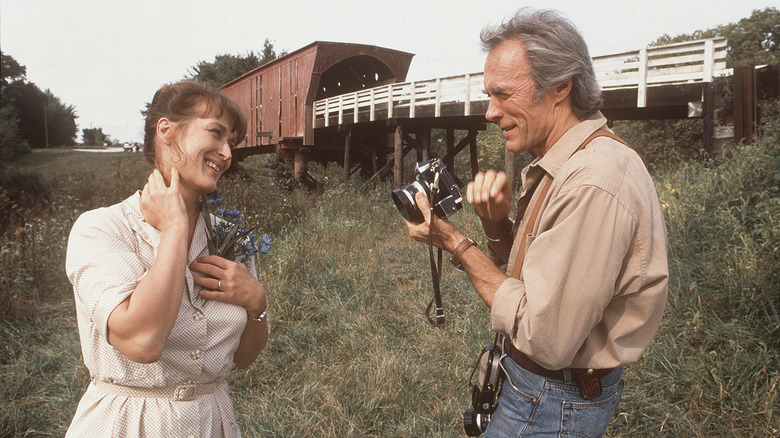
Warner Bros. Pictures
Robert James Waller's 1992 novel "The Bridges of Madison County" was adapted into a movie of the same name by Clint Eastwood in 1995. In addition to directing, Eastwood stars as photographer Robert Kincaid, who travels to Iowa in 1965 to photograph its historic covered bridges. There, he meets and falls in love with lonely housewife Francesca (Meryl Streep) with the two embarking on a passionate whirlwind affair. This romance stays with Robert and Francesca for the remainder of their lives, despite its briefness and their subsequent separation.
"The Bridges of Madison County" is Eastwood at his most wistfully poetic as a filmmaker, borrowing from his Western heroes and taking advantage of the beauty in quiet long shots. Streep brings a repressed passion to Francesca, one filled with longing that's liberated when Robert wanders into her life. The movie is a mature and frank look at illicit romance, along with a reevaluation of one's life in the face of being hit by an unexpected thunderbolt of love. "The Bridges of Madison County" stands as Streep's best film in the '90s; she earned her 10th career Oscar nomination.
Silkwood
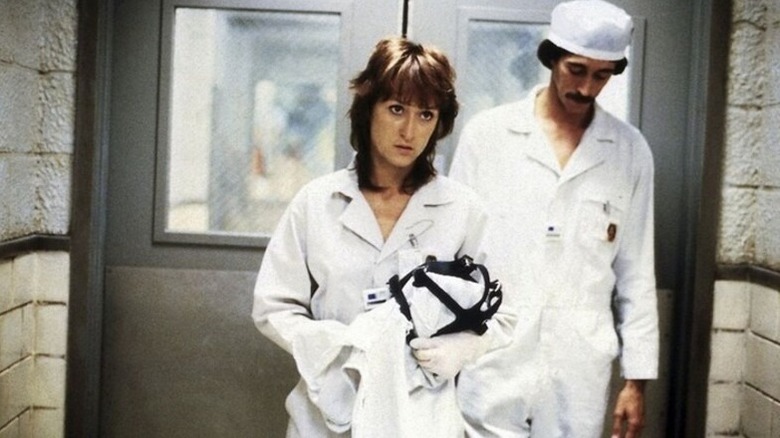
20th Century Studios
The first time Meryl Streep worked with Mike Nichols was with the 1983 biopic "Silkwood," recounting the life of corporate whistleblower Karen Silkwood. Silkwood (Streep) works at a manufacturing plant for nuclear reactor fuel rods in Oklahoma, but has misgivings about the safety conditions for herself and her coworkers. As she gathers evidence supporting her concerns, she faces heightened scrutiny at work, even after she's contained with radiation. This investigation also places a huge strain on Silkwood's personal relationships, including her boyfriend Drew (Kurt Russell).
Along with 1979's "Norma Rae," "Silkwood" set the template for working class activist movies, followed up by acclaimed films like "Erin Brockovich." "Silkwood" isn't an easy watch, favoring accuracy over conventional entertainment, and featuring an especially bleak ending. But it's Streep, joined by Russell and Cher, with the latter two playing against type from their usual roles, that helps maintain the audience's attention throughout this bitter story. Streep and Nichols continued to produce on-screen magic together in television and film through 2003, following their Academy Award nominations for "Silkwood."
The Devil Wears Prada
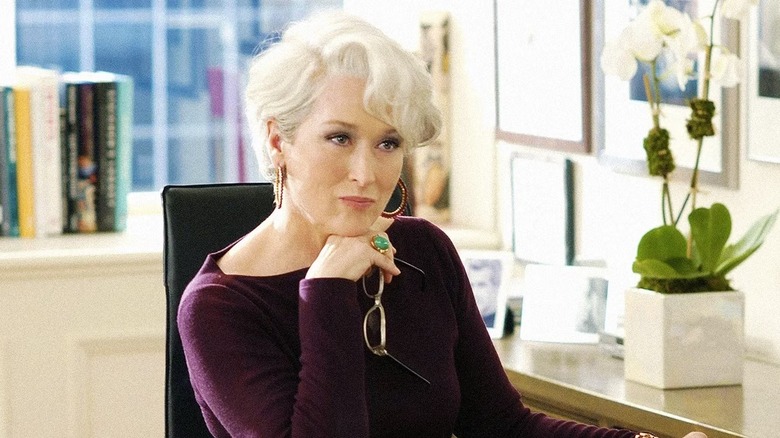
20th Century Studios
The 2003 novel "The Devil Wears Prada" was adapted into an enormously successful movie of the same name in 2006. The story follows recent journalism graduate Andy Sachs (Anne Hathaway), who is hired as the personal assistant to powerful fashionista and magazine editor-in-chief Miranda Priestly (Meryl Streep). As Andy assimilates into the high-pressure world of runway fashion and haute-couture, she becomes as cutthroat as the women who ostracized her at the beginning of her career. As Andy grows closer to Miranda, she learns just how manipulative her boss can be, leading her to reevaluate her life choices.
"The Devil Wears Prada" provides Streep with one of her most iconic roles and one certainly worthy of her immense talents. Streep delivers Miranda's cutting one-liners and withering observations of her colleagues with enough of an edge that they dig deep without betraying her icy cold demeanor. Indeed, it was Streep's enthusiasm to star in the project that significantly helped "The Devil Wears Prada" get made in the first place. Wickedly funny and instantly quotable, "The Devil Wears Prada" proves Streep is a comedy natural.
Out of Africa
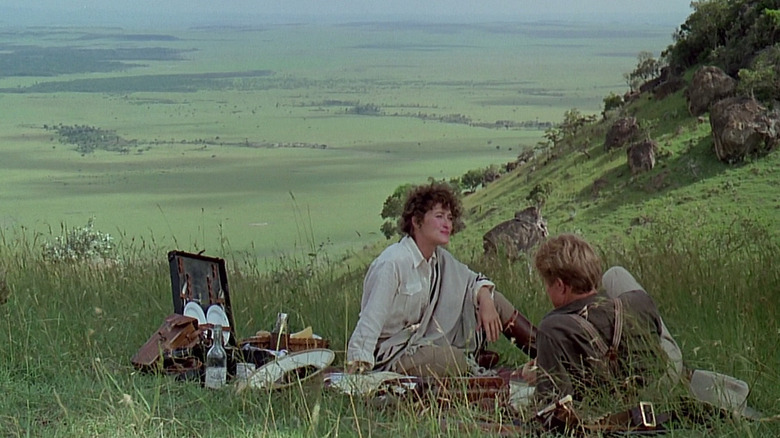
Universal Pictures
The life and times of Danish author Baroness Karen Blixen are depicted in the 1985 historical epic "Out of Africa," with Meryl Streep starring as Blixen. Set in East Africa on the eve of World War I, Blixen and her husband-of-convenience Baron Bror Blixen (Klaus Maria Brandauer) start a coffee farm in the region. As the Blixens' marriage deteriorates, Karen strikes up a romance with a renowned hunter Denys Finch Hatton (Robert Redford). However, as Denys grapples with the commitment, Karen's farm endures hardships that test her intent to stay in Africa, a land she has grown to love.
Running for nearly three hours, "Out of Africa" truly feels like a sprawling epic, with filmmaker Sydney Pollack taking full advantage of the gorgeous African landscape in the cinematography. Wisely keeping the story told from Karen's perspective, Streep keeps the proceedings moving along and her scenes with Redford are positively electric. Timeless without feeling dated and deliberately paced without feeling like a slog, "Out of Africa" provides a tour de force for all parties involved. Streep received her sixth Academy Award nomination for the movie, while Pollack and "Out of Africa" won Oscars for best director and best picture, respectively.
The Deer Hunter
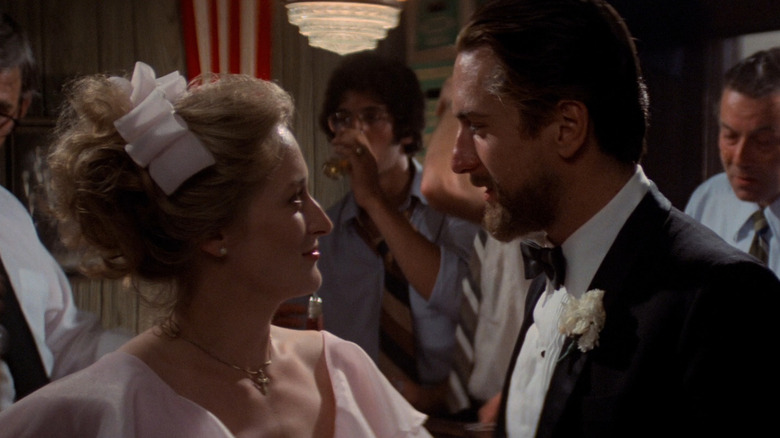
Universal Pictures
Streep's first Academy Award nomination was for best supporting actress in 1978's "The Deer Hunter," one of the best movies about the Vietnam War. The movie follows a small group of friends in Pennsylvania who leave their steelworking town to serve in Vietnam in the late '60s. The group's de facto leader is Mike (Robert De Niro), who is in love with Linda (Streep), the fiancee of his best friend Nick (Christopher Walken). Returning from the war traumatized by his experiences, Mike decides to return to Saigon to retrieve Nick, who remained in Vietnam instead of going home
"The Deer Hunter" is one of the most heart-shattering depictions of how war irrevocably alters lives on an individual scale, as its lead characters deal with the ensuing trauma. While the role of Linda isn't a particularly large one, Streep makes the most of her scenes, with Linda leaving a visible impact on Mike and Nick. "The Deer Hunter" also features the final film performance of John Cazale, Streep's partner at the time who was terminally ill during the movie's production. Watching Streep, that real-life grief informs so much of her performance as Linda faces her own loss and end of innocence, while her scenes with De Niro are subtly emotionally charged.
The Post
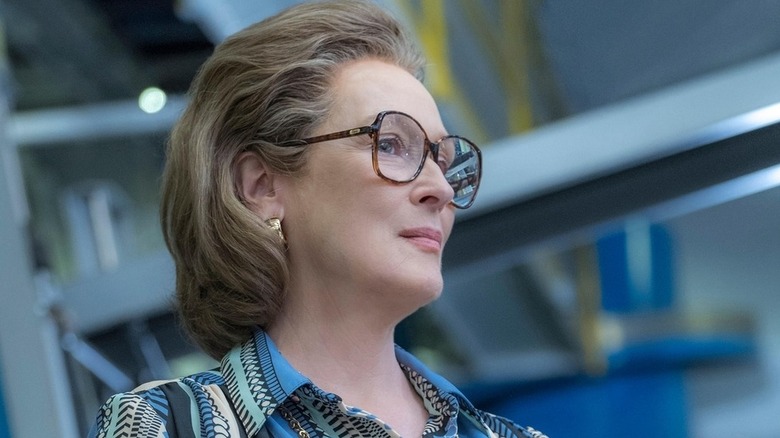
20th Century Studios
The publication of the Pentagon Papers, detailing the breadth of the American military's operations throughout Indochina during the Vietnam War, is a pivotal moment in journalism history. The circumstances behind The Washington Post publishing these confidential documents in 1971 is the basis for 2017's "The Post," directed and produced by Steven Spielberg. Meryl Streep stars as the newspaper's owner and publisher Katharine Graham, joined by Tom Hanks playing executive editor Ben Bradlee. The staff debates the risks associated with publishing documents classified by the government, including incurring the wrath of President Nixon.
Produced in less than a year, "The Post" is a movie that feels especially timely today despite its period piece setting. The accelerated production behind-the-scenes translates to a sense of urgency for "The Post," as its characters race to a controversial publishing decision. While telling a historical story, "The Post" really functions best as an allegory on the importance of journalism keeping the government accountable and the public informed. Streep earned her 21st Academy Award nomination for "The Post," extending her record-breaking run well into the 21st century.
Kramer vs. Kramer
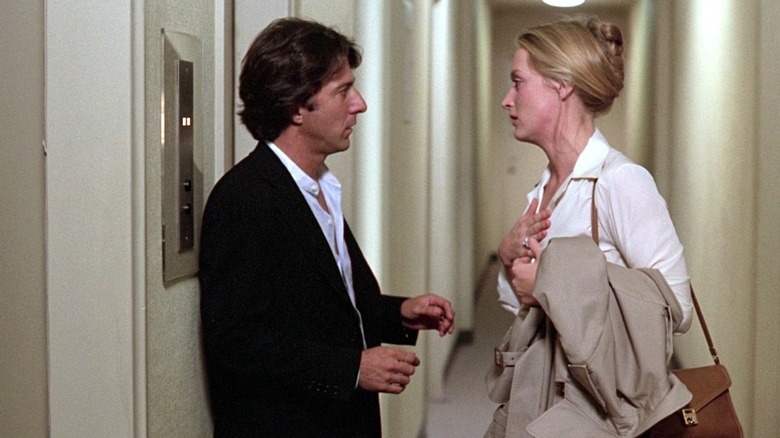
Columbia Pictures
Long before "Marriage Story," Hollywood examined the process and impact of divorce on a young family in 1979's "Kramer vs. Kramer." Meryl Streep and Dustin Hoffman (in one of his best performances) star as estranged married couple Joanna and Ted Kramer, respectively, with Joanna abruptly leaving Ted and their son Billy (Justin Henry). As Ted gradually learns how to become a responsible single father to Billy, Joanna petitions for sole custody of her son during the subsequent divorce proceedings. This leads to an increasingly bitter custody battle for Billy, as Joanna and Ted dredge up the acrimonious elements of their failed relationship.
At first glance, Joanna is the more overtly antagonistic character in "Kramer vs. Kramer," but Streep gives her additional depth and nuance. Joanna's pain and feelings of inadequacy articulated and brought to life by Streep gives the character a heightened dimension and sympathy. This makes the central conflict at the core of "Kramer vs. Kramer" all the more heartbreaking, with Streep making Joanna's anguish all the more palpable. Critics and audiences took notice, with Streep winning her first Academy Award for "Kramer vs. Kramer," and earning her second overall nomination.
Sophie's Choice
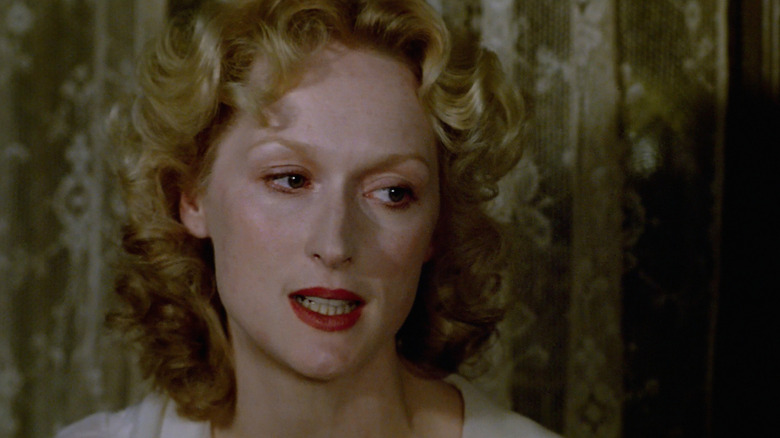
Universal Pictures
Adapting William Styron's 1979 novel of the same name, 1982's "Sophie's Choice" is set in New York shortly after World War II. The movie follows a young writer named Stingo (Peter MacNicol) who befriends a neighboring couple, Nathan (Kevin Kline) and Sophie (Meryl Streep). As Stingo and Sophie grow closer in the face of Nathan's erratically abusive behavior, Sophie's traumatic experiences during WWII come to light. This includes the reveal that she is a Holocaust survivor, who endured an especially nightmarish ordeal at the merciless hands of the Nazis.
Watching Streep's breakdown scene at the end of "Sophie's Choice" is a soul-shattering sight, given how raw and intense her performance is at that moment. Arguably, no other single scene in the remainder of Streep's celebrated filmography comes close to the visceral emotion that she brings as Sophie's tragic past is on full display. "Sophie's Choice" not only builds to this scene, but the entire movie hinges on it, and Streep knocks her standout moment out of the ballpark. Streep won her second Academy Award for "Sophie's Choice" and the movie remains the high-water mark of her impressively prolific acting career.


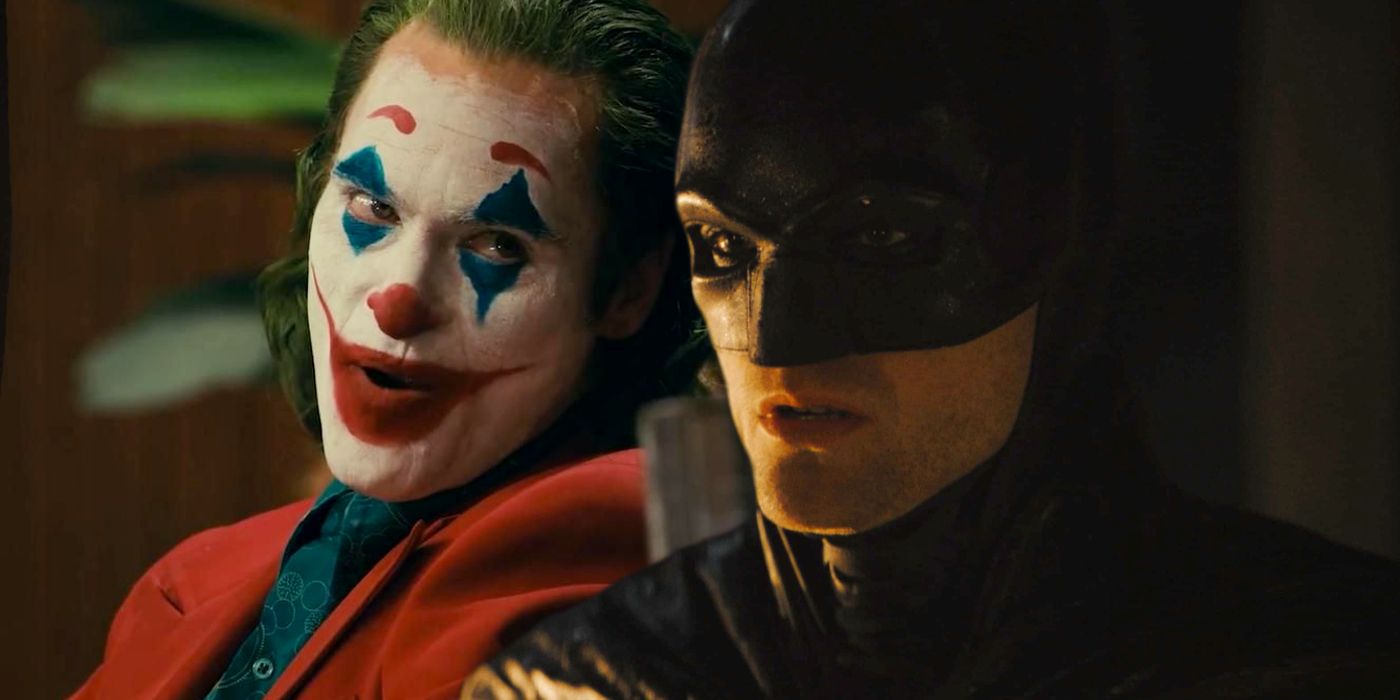






 English (US) ·
English (US) ·